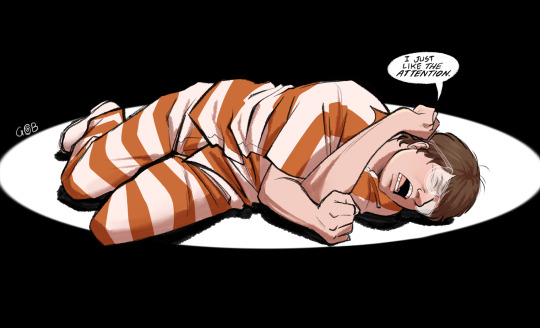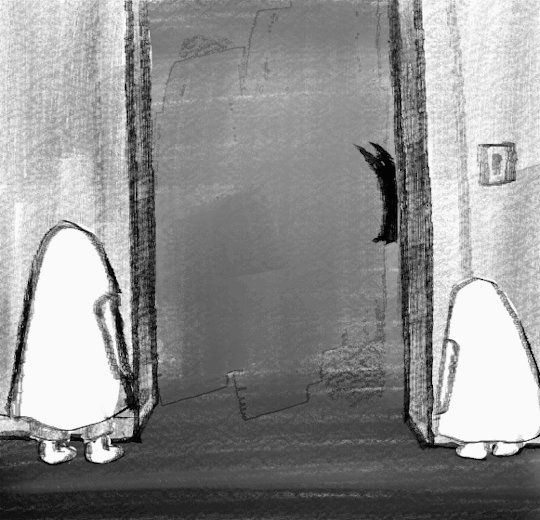Text

I may be in the early stages of another DC hyper fixation….
Study of Keith Weesner’s work from Btas!
#batman#joker#batjokes#btas#batman the animated series#bruce wayne#fanart#art study#visual development#1990s
40 notes
·
View notes
Text
Still mad we haven’t seen Harvey Bullock be called “Detective Bollock”
6 notes
·
View notes
Text
Me when riddler trophies
When your boss runs off with your paycheck

143 notes
·
View notes
Text
Okay imagine a Jason Todd and Joker fix it fic (I'm so sorry)
Jason:
Joker:
Jason:
Joker:
Joker: ...so we good?
Jason: NO WE AREN'T FUCKING GOOD
49 notes
·
View notes
Text

Completely random, but sometimes I like to imagine the headlights turning off sounding more like a theatre spotlight.
The final dance is over, lights off, it’s over. The beam was there, the boundaries and clear division; all that’s left is some muddied game between two sick men, both about to blur into some horrid mess of humanity’s worst.
No dancing, no glamour or triumph, just a very sad end left in an unremarkable pool of blood.
24 notes
·
View notes
Text
The colours!!!! Ahhh so good!

An old picture of Edward (greetings in the ask)
563 notes
·
View notes
Text


From a larger composition piece looking at colour/notan values
29 notes
·
View notes
Text

“What have I done”
190 notes
·
View notes
Text
“Most people don’t do it the way I do, very personal. Even the money, twenties, tens, I just like sausage”

Charlie coded
#its always sunny in philadelphia#charlie day#charlie kelly#dennis reynolds#iasip#frank reynolds#glass animals
9 notes
·
View notes
Text
An Analyis of the Ending of "The Killing Joke"

This scene is one I've wanted to get my thoughts written out on for a while and one of the most interesting in all of DC comics from how important it is to understanding both the characters of Batman and the Joker.
So, this scene is the finale of the oneshot comic "The Killing Joke" By Alan Moore, and is directly preceeded by Batman once again foiling the Joker's evil plan, beating him both verbally and physically before then kicking him to the ground to seemingly knock him out.
For what then follows, I will post the full comic pages so you can absorb the scene first.
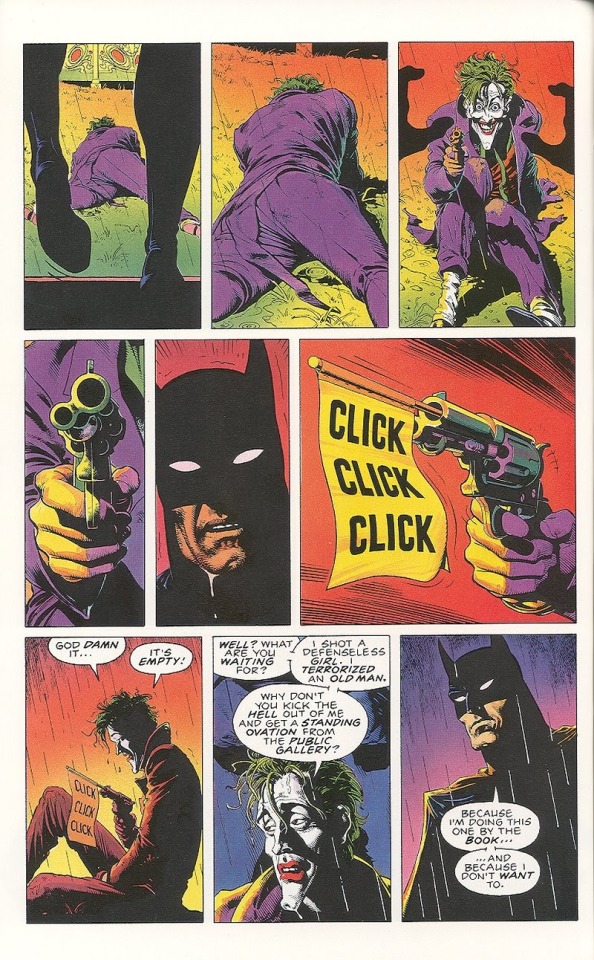
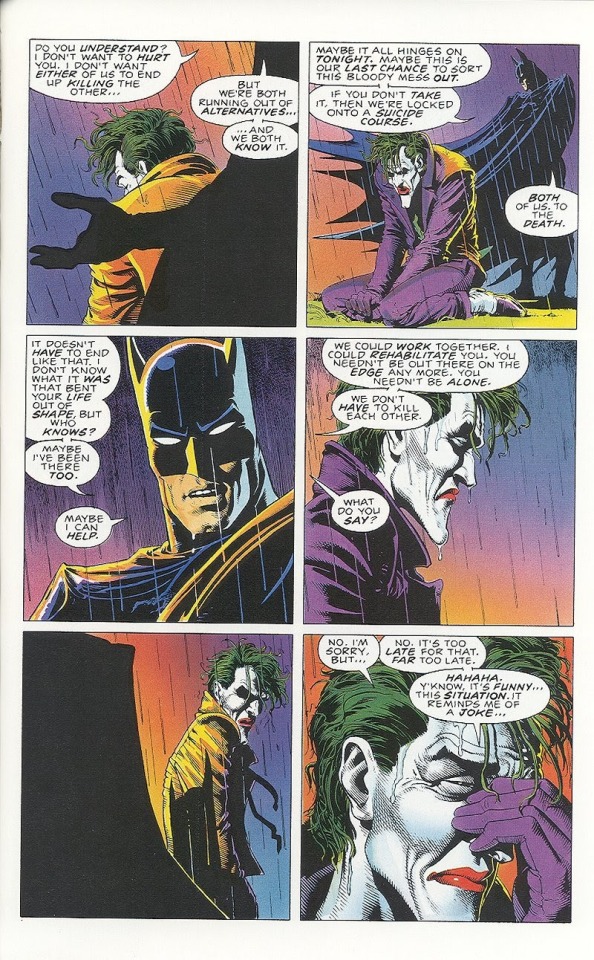
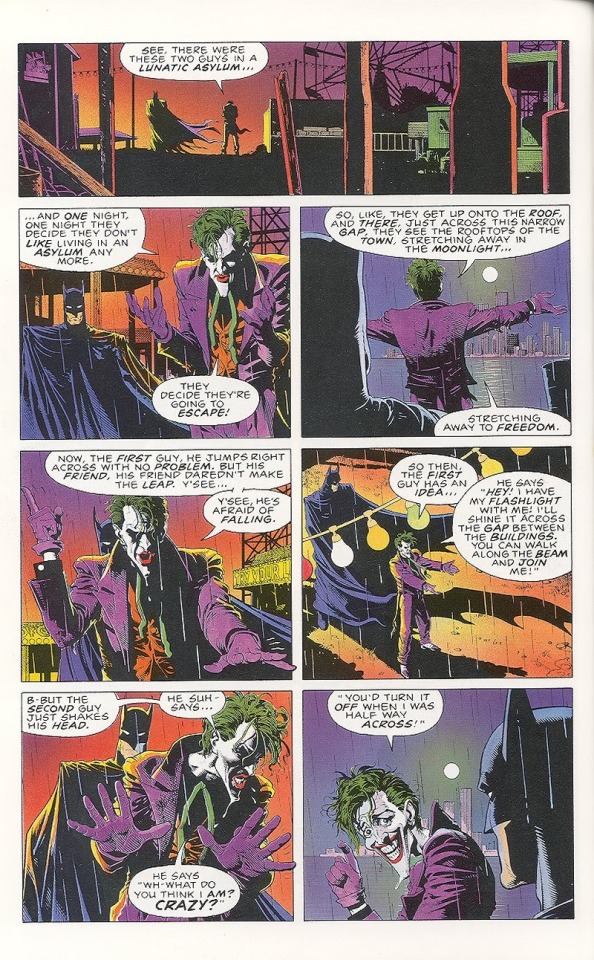
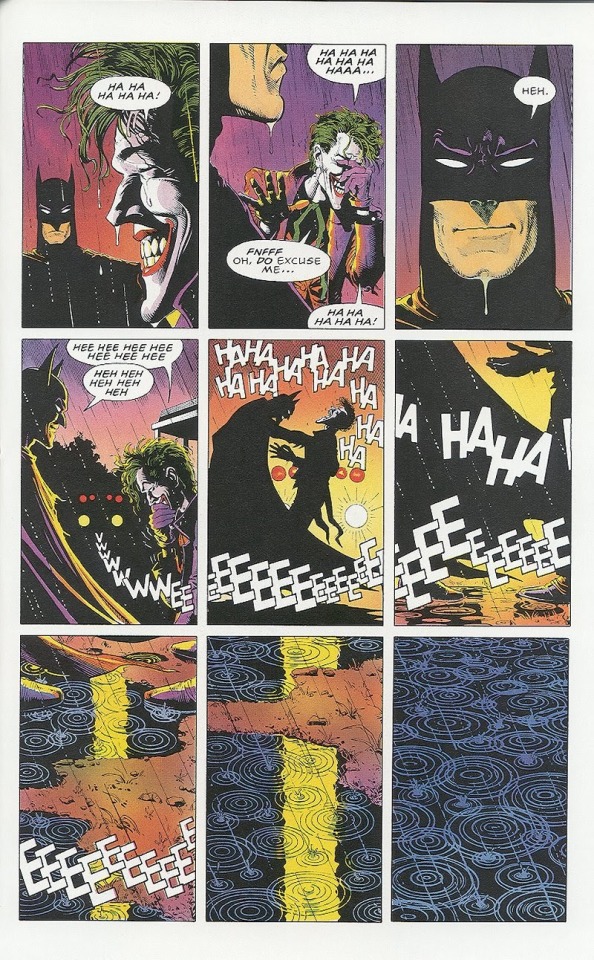
Ah, the infamous cutaway that leaves the ending so open to interpretation. But what exactly does all of this mean? Well, I'll give my interpretation:
The scene starts in the same way as many other fights between Batman and Joker have concluded. Joker gets defeated, Batman saves the day, the clown prince of crime will get chucked back into Arkham until he inevitably breaks out once again, and then they'll do the whole thing over. "You know, I think you and I are destined to do this forever", that's how their story always goes. However, this time things are different.
This time, Batman doesn't beat Joker senseless, even though cosnidering what Joker spent that evening doing to his friends and family, he would richly deserve a good beating by anyone's estimation. Joker expects that of Batman as well, and he accepts the beating and re-imprisonment that he's sure is coming his way, because that's how it's always been. And yet instead, this time Batman chooses to talk with him. He tells Joker the facts of the situation, that despite everything, he actually doesn't WANT to hurt him, and knows that if they keep going down their current path, one of them will eventually kill the other. Batman knows it, and he knows that Joker knows it too, and he doesn't want that to be the case, because above everything else Batman values preserving human life as a goal equal to and often greater than stopping crime. He doesn't want to kill Joker, it would go against everything he stands for, but he knows with every encounter they share that possibiltiy grows more and more likely.
In a similar fashion, the Joker doesn't actually want to kill Batman either. Despite how he may play the part of wanting otherwise, the entire story of the comic up until this point has been about Joker trying to prove a point to Batman. That deep down, everyone can become him, that all it takes is one bad day to turn even the most moral man alive into the Joker. whether this is because Joker genuinely believes this, or it is meant to simply justify and excuse who he himself became from his own tragedy, is never really confirmed, though it is most likely a bit of both.
Either way, we see that Joker is not happy at all by Batman attempting to talk to him instead of beating him. In fact, he's practically sulking. Now, is this due to the fact that his big plan just failed, sure, at least partly. However, there is something else going on as well. All of Joker's plans fail sooner or later, this is no exception. It's something he expects despite coming up with a new one every week. This time though, he genuinely looks depressed, and this is in part due to Batman breaking the magic of their routine. By speaking to him like anyone else, by reaching out to Joker, Batman is attempting to fundamentally change their relationship forever. Batman wants it to end, he doesn't want to keep fighting Joker until it kills one of them, he wants Joker to stop. But Joker doesn't want to stop, he doesn't want Batman to die or stop chasing him because the relationship he has with Batman is all he has left. He has no real friends, no goals outside of plans to mess with Batman more, he has nothing outside of his role as Batman's arch enemy, and he knows it.
And yet, despite all that, when Batman genuinely reaches out to him, appeals to the fact that their lives were both heavily affected by past tragedies and offers Joker help to try and move past that, to be better, even after all the atrocities he's committed, despite all that... Joker actually seems to consider his offer. We can see this by his hesitation, and the fact that he doesn't just laugh it off right away or make fun of Batman as he would any other time.
This time, Joker seems to consider the offer, and turns dead serious in a moment that is probably the most normal display of genuine human emotion we get from him, and he tells Batman that he's sorry. Joker genuinely apologizes for not being able to take Batman up on his offer, looking like he's about to cry as he declares that it's far too late for him to take any offer Batman could give him.
The question is, why? Why is this time so different, why does Joker seem to actually consider Batman's offer and reject it in such a human manner? Well, I truly believe the answer is clearly seen in the joke that the conversation with Batman reminds him of. I will go through it line by line and give my interpretation.
"See, there were these two guys locked in a lunatic asylum" I think this obviously is referring to Batman and Joker. They are the characters of this joke/story, the conversation between them reminded Joker of this joke (or he just came up with it on the spot to suit their situation, but regardless) and they are also the only two characters in the panel where that line is said. In this case, the 'asylum' in question would be their rivalry, their roles as Batman and Joker and everything that comes along with that. Makes sense, none of the things either of them do in those roles are things that normal, sane people do, and both of them were traumatized in their lives by horrible events and spiraled into becoming the Batman and Joker because of it.
"And one night, one night they decide they don't like living in an asylum anymore, they decide they're going to escape." This is a clear metaphor for ending their roles as Batman and Joker, perhaps just for that particular rivalry or all together. Escaping the asylum means returning to the normal, happy lives they had before their trauma. Batman has already stated he wants to end his fighting with Joker, however the fact that both men in the story wish to leave the asylum together implies that Joker also secretly wants that too, which is very interesting as we go on.
"So like, they get up onto the roof, and there, just across this narrow gap, they see the rooftops of the town, stretching away in the moonlight, stretching to freedom." Given that Joker is looking at the moon shining over Gotham as he says this, I think it's clear that the 'freedom' here is living a normal human life the same way all the civilians of Gotham try to every day. It's about having a chance to be better, to do better and make something of your life everyday beyond the endless cycle that he and Batman are trapped in with each other. As long as that cycle exists, they can never truly be free, even though the Joker can break out of Arkham whenever he wants and do practically whatever he wants until Batman stops him. Their rivalry prevents either of them from ever being free.
"Now the first guy, he jumps right across with no problem. But his friend, his friend daredn't make the leap. Y'see, y'see he's afraid of falling." This is where we see Joker differentiate himself and Batman in the story, and how their situations in life currently exist. Batman is the first guy who is able to escape the asylum and return to the city fairly easily, whenever he desires. This is because that, unlike Joker, Batman has his life as Bruce Wayne to live and fall back onto. He has many friends and a large family both adopted and biological who rely on him and give him something good and happy to live for. He can leave the asylum because he sees the light on the other side, he has hope and knowledge that things will turn out alright if he does. But Joker does not. Joker doesn't have another life to live, no family and no friends to fall back on and lift him up. All his life consists of is the asylum and Batman, the other man right along with him. He knows nothing else, and so it seems impossible for him to ever jump across to the other side and join Batman in freedom.
However, it goes beyond that. Joker isn't scared to leave the asylum because it's all he knows, in fact he's just as eager to leave it with Batman. What he is afraid of though, is FALLING as he jumps across. What does falling mean in this case? Well since escaping the asylum would mean ditching the roles of Batman and Joker and returning to a normal life, falling would be failing to do just that, failing so hard that it sends him plummeting right back down, either to death or to being left alone and away from the safety of the asylum and more importantly the companionship of Batman. if he falls but Batman doesn't, he'll be left lost and alone, pointless and forgotten, and that's what Joker fears by leaving the asylum.
"So then the first guy has an idea. He says 'Hey! I have my flashlight with me! I'll shine it across the gap between the buildings. You can walk across the beam and join me!" This part of the metaphor I believe is meant to represent Batman's offer of help to the Joker, the therapy/rehabilitation that's intended to help him get better. In this case though, the help is being represented by something that has little actual effect. You can't walk across a beam of light to cross over to another building, in the joke it's only meant to stop the second guy's fear of falling. It isn't actually a real bridge to freedom, just an illusion of one that Joker thinks Batman is giving him.
However, than we get to the punchline.
"B-but the second guy shakes his head. He suh-says, he says, 'wh-what do you think I am? Crazy? You'd turn it off when I was halfway across!"
And here we get the real reason why Joker can't take Batman's offer, why he can't join him in freedom outside of the asylum. It isn't because he doesn't think the help Batman is offering him would work. The beam of light not being a real bridge to walk across isn't the problem in his eyes. The problem, is that believes that if he tried to walk across it, Batman would shut it off and let him fall. Because what Joker is truly scared of, isn't that the help Batman's offering him wouldn't work, he's scared that the help might actually have a chance at working, that he may have a way to get out of the asylum for good, but that Batman will give up on him before he reaches the other side.
He's afraid that the only person in the world who genuinely cares about him and wants to help him, will end up giving up on him and forgetting him if he tries to get better. We can see that in the way Joker delivers the punchline, turned around to stare directly into Batman's face with a disturbed, crushing smile of realization on his face while the symbol of freedom that is Gotham, bathed in the light of the moon sits directly behind him, just out of reach. He's accusing/telling Batman of why he's afraid, that he could never trust him enough to actually try and rehabilitate him, and he's laughing because he knows there's no way out of this.
And Batman, once the joke finally hits him, realizes the exact same thing. He knows then that Joker will never actually be able to be helped, there is nothing he can do for him because Joker will never trust him enough to let himself be helped. There is no way out of this for them now that Batman's final appeal to peace has been turned down by a man to broken to realize it was his way to a better life, a free life.
And so, knowing now how their story will end, Batman does the one thing that Joker always wanted from him, and breaks his role as Batman for just a moment. He shares in a final laugh with Joker as he puts his hands on his shoulders, up by Joker's neck, and the two laugh and laugh together until the scene cuts away and their laughter cuts off equally as quick.
Now, did Batman kill Joker here? The single question everyone tends to ask when they read this scene. Now, canonically we know that, no, Batman does not kill him, Joker returns again and again after this, but in this case I do fully believe that the creator of this comic, Alan Moore (the same man who wrote Watchmen), did likely intend for that to be the ending. The fact that the scene opens with Batman acknowledging that their relationship will end in death, and that the only way out of that is for Joker to accept his proposal I think seals the intent of the ending pretty well. Joker Can't accept his proposal, because the trust between them that would be necessary for that is something that could never truly be built up as they exist in their roles as Batman and Joker. They both know this, and so Batman ends their relationship and breaks his one rule by freeing Joker the only way left it is possible to free him, in death.
So, as much as I personally think that having Batman kill at all is a fundamental no no that you just can't do with his character because it goes against everything he stands for, I think this as an intended ending by Alan Moore to the relationship of Batman and Joker works very well. It is one of many endings in across many comics. Is it my favourite? No, though I would put it in my top three. however, I do think that this is the meaning that Moore was trying to convey in this scene, and I truly believe he does a beautiful job at conveying it!
81 notes
·
View notes
Text
YOU SPINNMENRIGHT ROUND BABY RIGHT ‘ROUND
Jonathan Crane Detail Turnaround || Arkham Shadow
310 notes
·
View notes



